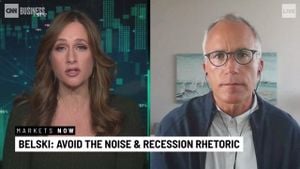President-elect Donald Trump's nomination of Chris Wright, the CEO of Liberty Energy, to lead the Department of Energy has set off intense debate over the future of U.S. energy policy. Wright, known for his controversial views on climate change and strong advocacy for fossil fuels, may signal a shift back toward traditional energy sources and away from renewable alternatives.
Environmental groups have expressed deep concerns about this appointment, warning it could undermine efforts to combat the climate crisis. Wright's credentials are rooted firmly within the oil and gas sectors; he has been pivotal in the hydraulic fracturing industry, bringing innovations to what many call "the American Shale Revolution." Trump has described Wright as "a leading technologist and entrepreneur," crediting him with significant advancements across various energy sectors including nuclear, solar, geothermal, and, most prominently, oil and gas.
Wright's commitment to fossil fuels is unwavering. Despite acknowledging climate change as "a real problem," he has dismissed the concept of there being any urgent climate crisis or transition needed to renewable energy sources. He once claimed, "There is no climate crisis, and we’re not in the midst of an energy transition either," reflecting his skepticism of mainstream climate science. This perspective is echoed by conservative groups who see the appointment as aligning with Trump's promises to prioritize energy independence through increased fossil fuel production.
Trump's new Cabinet picks, including Wright, North Dakota Governor Doug Burgum as Secretary of the Interior, and former U.S. Representative Lee Zeldin to lead the Environmental Protection Agency, form what supporters are calling a "powerful trifecta" aimed at reigniting American energy dominance. Daniel Turner, founder of non-profit Power the Future, hailed Wright’s selection, asserting it would release American energy potential and push back against what he labels the "failed Biden-Harris energy policy."
On the contrary, environmental advocates are sounding alarms over Trump's energy strategy. The Natural Resources Defense Council criticized Wright's selection, stating, "Given the devastating impacts of climate-fueled disasters, DOE's core mission of researching and promoting cleaner energy solutions is more important now than ever." They express fears this appointment will hinder U.S. progress toward adopting cleaner energy technologies.
Wright's influence as Energy Secretary could put the Department of Energy's efforts to innovate and expand renewable energy resources at risk. He has openly contested not only the urgency of transitioning to greener energy but also has taken positions against regulations intended to promote environmental justice and support community involvement in energy projects. Critics, such as Tiernan Sittenfeld from the League of Conservation Voters, labeled the appointment as "appalling," reflecting the broad discontent among those who advocate for urgent climate action.
The potential impact of Wright's leadership may extend to major energy projects including liquefied natural gas (LNG) export facilities. Trump has indicated his desire to expand these ventures, positioning Wright to oversee this aspect of energy policy. Current Energy Secretary Jennifer Granholm promised detailed assessments of LNG's public risks and benefits by year’s end, yet Wright’s strategies could fast-track approvals and fuelling the fossil fuel sector’s operations.
Notably, Wright has no prior experience working within the government, raising questions about his ability to navigate the regulatory frameworks and environmental responsibilities associated with the department. His history includes leading Liberty Energy, which focuses primarily on fracking, as well as serving on the board of nuclear technology ventures. Some industry insiders and Republican donors see his appointment as necessary to stabilize energy markets and support the traditional energy economy.
Throughout his career, Wright has positioned himself as both pro-energy and somewhat dismissive of the catastrophic forecasts presented by climate science. He has articulated opinions indicating fossil fuels are integral to alleviating poverty and enabling growth, particularly advocating for continued reliance on oil and gas globally to support international development.
Responding to Wright's nomination, critics argue the Trump administration may simply mirror the policies from the early 2000s under President George W. Bush, potentially leading to environments rife with pollution and health concerns. The perspectives related to environmental justice suggest Wright's policies could worsen inequalities, particularly affecting low-income and marginalized communities heavily impacted by fossil fuel extraction operations.
Equipped with progressive views on energy, figures like Rep. Luis Raul Torres have voiced staunch opposition to Wright's selection, emphasizing the need to pivot from fossil fuels to sustainable energy sources. Torres asserted, "The transition to renewable energy is not an ideological whim, but an existential necessity," stressing the importance of prioritizing cleaner alternatives for the wellbeing of both the planet and its inhabitants.
The stakes couldn't be higher as the Department of Energy faces uncertain times. The agency historically plays an influential role not only at home but also on the global stage, particularly as climate talks involving multiple nations are underway. With Trump prioritizing fossil fuels, the future direction of U.S. energy policy remains highly contentious, pitting fossil fuel interests against the pressing need for climate action.
The incoming administration’s approach under Wright’s leadership is bound to face rigorous scrutiny. How this balances public health, environmental integrity, and energy demands will be pivotal as advocacy groups work to fight legislative regressions on climate policy and promote new clean energy initiatives.
Wright’s confirmation as Secretary of Energy signals not just the implementation of Trump’s grand energy agenda but also renews critiques about the unapologetic reliance on fossil fuels amid contemporary environmental crises.
With mounting global concerns surrounding climate change, Wright's leadership could very well reshape how the U.S. approaches energy governance—raising the question of whether America will continue down the path of relying on traditional fossil fuels or embrace the inevitable transition to sustainable energy—a decision time will tell.



